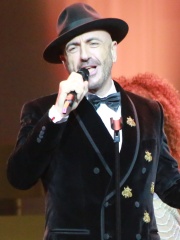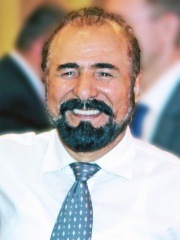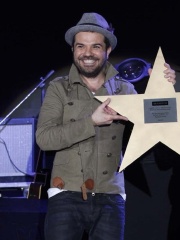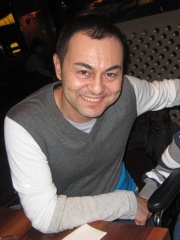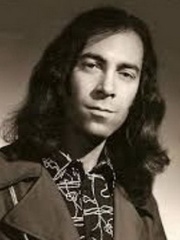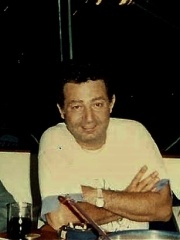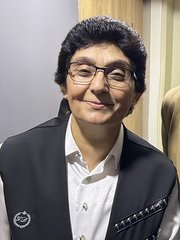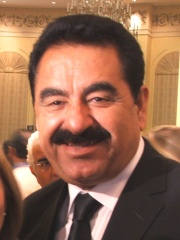
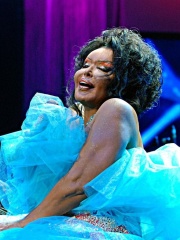
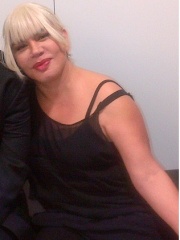

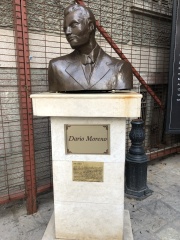
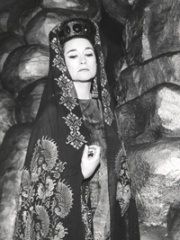

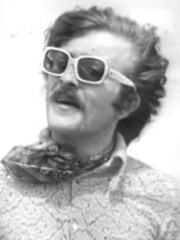
The Most Famous
SINGERS from Türkiye
Top 10
The following people are considered by Pantheon to be the top 10 most legendary Turkish Singers of all time. This list of famous Turkish Singers is sorted by HPI (Historical Popularity Index), a metric that aggregates information on a biography's online popularity. Visit the rankings page to view the entire list of Turkish Singers.

1. İbrahim Tatlıses (b. 1952)
With an HPI of 68.08, İbrahim Tatlıses is the most famous Turkish Singer. His biography has been translated into 28 different languages on wikipedia.
İbrahim Tatlıses (born İbrahim Tatlı in 1952) is a Turkish folk singer and former actor of Arab-Kurdish descent. Since the 1970s he has been one of the best-known and most successful singers of the pop Arabesk style. Tatlıses has recorded 42 albums, including notable albums such as Ayağında Kundura and Selam Olsun and was the host of the highly popular television programme İbo Show. He was also a leading actor that appeared in several dozen films, and also has had many business ventures.

2. Bülent Ersoy (b. 1952)
With an HPI of 66.35, Bülent Ersoy is the 2nd most famous Turkish Singer. Her biography has been translated into 27 different languages.
Bülent Ersoy (Turkish pronunciation: [byˈlænt ˈæɾsoj]; born Bülent Erkoç on 9 June 1952) is a Turkish singer and actress. She is known as one of the most popular singers of Turkish music, nicknamed Diva by her fans. Ersoy has many famous hits such as "Ümit Hırsızı" (Hope Thief), "Geceler" (Nights), "Beddua" (Curse), "Maazallah" (God Forbid), "Biz Ayrılamayız" (We Cannot Break Up), and "Sefam Olsun" (I Enjoy Myself). Ersoy has published more than thirty albums so far and has made a name for herself in Turkish music history.

3. Sezen Aksu (b. 1954)
With an HPI of 66.03, Sezen Aksu is the 3rd most famous Turkish Singer. Her biography has been translated into 50 different languages.
Sezen Aksu (Turkish pronunciation: [seˈzen ˈaksu]; born Fatma Sezen Yıldırım; 13 July 1954) is a Turkish singer, songwriter and producer. She is one of the most successful Turkish singers, having sold over 40 million albums worldwide. Her nicknames include the "Queen of Turkish Pop" and "Minik Serçe" ("Little Sparrow"). Aksu's influence on Turkish pop and world music has continued since her debut in 1975, and has been reinforced by her patronage of and collaboration with many other musicians, including Yonca Evcimik, Sertab Erener, Şebnem Ferah, Aşkın Nur Yengi, Hande Yener, Yıldız Tilbe, Işın Karaca, Seden Gürel, Harun Kolçak and Levent Yüksel. Sezen Aksu is widely known as a successful songwriter. Her work with Tarkan resulted in continental hits like "Şımarık" and "Şıkıdım" and her collaboration with Goran Bregović widened her international audience. In 2010, NPR named her as one of the "50 Great Voices" of the world.

4. Ajda Pekkan (b. 1946)
With an HPI of 65.91, Ajda Pekkan is the 4th most famous Turkish Singer. Her biography has been translated into 33 different languages.
Ayşe Ajda Pekkan (Turkish pronunciation: [aʒˈda pekˈkan]; born 12 February 1946) is a Turkish singer. She is known by the title "superstar" in the Turkish media. Pekkan became a prominent figure of Turkish pop music with her songs, in which she tried to create a strong female figure. By keeping her works updated and getting influence from Western elements, she managed to become one of Turkey's modern and enduring icons in different periods. Her musical style has kept her popular for more than 50 years and has inspired many of her successors. Pekkan is highly respected in the music industry and her vocal techniques together with many of her albums were praised by music critics. Born in Beyoğlu, Istanbul, Pekkan's musical career began in the early 1960s when she appeared in a nightclub as a member of the music group Los Çatikos. However, in 1963, when she won the Ses magazine's cinema artist competition, she became known as an actress, and for a number of years she pursued an acting career. In the same year, she played the leading role in her first film Adanalı Tayfur and became one of the young faces of Turkish cinema at the time. Over the next six years, she starred in nearly 50 black and white films, including Şıpsevdi (1963), Hızır Dede (1964) and Şaka ile Karışık (1965). She eventually quit acting and focused entirely on her singing career. Pekkan spent the first twenty years of her singing career with dozens of songs released as cover versions. These songs, which were generally written by Fikret Şeneş and included "Kimler Geldi Kimler Geçti", "Palavra Palavra", "Sana Neler Edeceğim", "Hoş Gör Sen", "Sana Ne Kime Ne", "Bambaşka Biri", "Uykusuz Her Gece" and "O Benim Dünyam", later took their place among the best known songs of both Pekkan's career and the Turkish pop music genre. From the 1990s onwards, she worked with various songwriters and arrangers, including Şehrazat and Sezen Aksu. During this period, many of her songs such as "Yaz Yaz Yaz", "Sarıl Bana", "Eğlen Güzelim", "Vitrin", "Aynen Öyle" and "Yakar Geçerim" ranked among the best songs on Turkey's music charts. Her fame grew steadily throughout the 1970s outside her home country, and particularly in Europe, and it was reinforced by concerts in different countries. She also recorded a French album in 1978. Due to her increasing popularity, Pekkan was viewed as a potential candidate to represent Turkey in the Eurovision Song Contest 1980 and she reluctantly accepted to participate in the contest. Disappointed that her song "Pet'r Oil" ranked fifteenth in the contest, she decided to take a break from her career for a few years. By selling over 15 million records, Ajda Pekkan is one of the best-selling artists of all time in Turkey. She also holds the title of "State Artist" in Turkey and has been awarded the honorary distinction of Officier of the Ordre des Arts et des Lettres by the French government. Three of her albums were included in the list of the Best 100 Albums of Turkey by Hürriyet newspaper. In 2016, Pekkan's name appeared in The Hollywood Reporter's Power 100, a list of the 100 most powerful women in entertainment. Although she does not self-identify as a feminist, many of her songs which tell the stories of powerful women were used as feminist anthems.
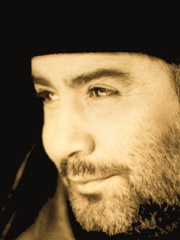
5. Ahmet Kaya (1957 - 2000)
With an HPI of 63.16, Ahmet Kaya is the 5th most famous Turkish Singer. His biography has been translated into 28 different languages.
Ahmet Kaya (28 October 1957 – 16 November 2000) was a Turkish–Kurdish folk singer. Kaya was persecuted by Turkish nationalist celebrities and authorities. Kaya left Turkey in an act of self-exile, and moved to France, where he would shortly after die of a heart attack. He was granted the Musician of the Year Award in February 1999 during a controversial award ceremony involving Turkey's most popular singers, at which he declared that he wanted to sing a song in Kurdish.

6. Darío Moreno (1921 - 1968)
With an HPI of 62.54, Darío Moreno is the 6th most famous Turkish Singer. Her biography has been translated into 18 different languages.
David Arugete (Hebrew: דריו מורנו; 3 April 1921 – 1 December 1968), commonly known under his stage name Dario Moreno, was a Turkish-Jewish polyglot singer, an accomplished composer, lyricist, and guitarist. He attained fame and made a remarkable career centred in France which also included films, during the 1950s and the 1960s. He became famous with his 1961 song Brigitte Bardot.

7. Leyla Gencer (1928 - 2008)
With an HPI of 62.16, Leyla Gencer is the 7th most famous Turkish Singer. Her biography has been translated into 25 different languages.
Leyla Gencer (Turkish pronunciation: [lejˈla ɟenˈdʒeɾ], née Çeyrekgil; 10 October 1928 – 10 May 2008) also known as La Diva Turca was a Turkish operatic soprano. Gencer was a notable bel canto soprano who spent most of her career in Italy, from the early 1950s through the mid-1980s, and had a repertoire encompassing more than seventy roles. She made very few commercial recordings; however, numerous bootleg recordings of her performances exist. She was particularly associated with the heroines of Donizetti.

8. Sertab Erener (b. 1964)
With an HPI of 61.14, Sertab Erener is the 8th most famous Turkish Singer. Her biography has been translated into 56 different languages.
Sertab Erener (born 4 December 1964) is a Turkish singer, songwriter and composer. With her coloratura soprano voice, she started working as a backing vocalist for Sezen Aksu, and with Aksu's help she released her first studio album in the 1990s. Because of her education in classical music, she initially had difficulties in performing pop music. Although she did experimental works from time to time, she eventually preferred to focus on making pop music instead of avant-garde works, in order to make her music heard by a larger audience. In some of her works, she combined Western music and Eastern music, and benefited from operas as well as classical Turkish music with ethnic elements. With her entrance to Europe's market in the early 2000s, many of her works were also sold in Turkey as well as European countries. With Sezen Aksu's help, she made her debut in 1992 with the album Sakin Ol!, and made herself known as a Turkish pop music artist in the 1990s by releasing the albums Lâ'l (1994), Sertab Gibi (1997) and Sertab Erener (1999). From these albums, the songs "Sakin Ol!", "Aldırma Deli Gönlüm", "Ateşle Barut", "Sevdam Ağlıyor", "Aslolan Aşktır", "Yanarım", "Zor Kadın" and "Vur Yüreğim" became number-one hits in Turkey. In the early 2000s, she continued her work by releasing the songs "Kumsalda" and "Kendime Yeni Bir Ben Lazım". She won the Eurovision Song Contest 2003 with the song "Everyway That I Can", marking Turkey's first victory in the competition. In 2004, she released the album No Boundaries, followed by Aşk Ölmez in 2005. After five years, she released another Turkish studio album Rengârenk in 2010, and the hit songs "Bu Böyle", "Açık Adres" and "Koparılan Çiçekler" made the album a successful work, and marked her return to the music market. After Rengârenk, she released the album Ey Şuh-i Sertab (2012), which was dedicated to her father. At the same year, she received the Best Female TSM Soloist award at the Golden Butterfly Awards. In 2013, her new album Sade was released. The songs "İyileşiyorum", "Öyle de Güzel" and "Söz" all became hits in Turkey. In 2016, with the release of Kırık Kalpler Albümü, Erener stated that she was returning to her 90s style. The album received favorable reviews, and "Kime Diyorum" and "Olsun" both became hit songs in Turkey. Erener has been praised for her music style and is one of the most successful artists who were discovered by Sezen Aksu. Due to her championship in Eurovision, she received the State Medal of Distinguished Service. In 2014, Hürriyet named her in its list of "91 Symbols of the 91st Anniversary of the Republic". Aside from her career as a singer, she also taught music at Müjdat Gezen Art Center for one year. Erener has been married three times, the second of which was to Levent Yüksel during 1990–96. She married Emre Kula in 2015. Throughout her career she has won seven Kral TV Video Music Awards as well as two Golden Butterfly Awards, and has received various other nominations.

9. Cem Karaca (1945 - 2004)
With an HPI of 59.72, Cem Karaca is the 9th most famous Turkish Singer. His biography has been translated into 17 different languages.
Muhtar Cem Karaca (5 April 1945 – 8 February 2004) was a Turkish legendary rock musician and one of the most important figures in the Anatolian rock movement. He was a graduate of Robert College. He worked with various Turkish rock bands such as Apaşlar, Kardaşlar, Moğollar and Dervişan. With these bands, he brought a new understanding and interpretation to Turkish rock.
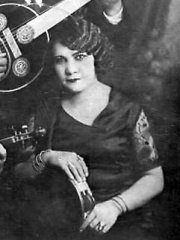
10. Roza Eskenazi (1895 - 1980)
With an HPI of 59.61, Roza Eskenazi is the 10th most famous Turkish Singer. Her biography has been translated into 19 different languages.
Roza Eskenazi (Greek: Ρόζα Εσκενάζυ; c. 1895 – 2 December 1980) was a Greek dancer and singer of rebetiko, Greek folk music, Kanto and Turkish folk music born in Istanbul, whose recording and stage career extended from the late 1920s into the 1970s.
People
Pantheon has 46 people classified as Turkish singers born between 1895 and 2000. Of these 46, 37 (80.43%) of them are still alive today. The most famous living Turkish singers include İbrahim Tatlıses, Bülent Ersoy, and Sezen Aksu. The most famous deceased Turkish singers include Ahmet Kaya, Darío Moreno, and Leyla Gencer. As of April 2024, 5 new Turkish singers have been added to Pantheon including Emrah, Güler Duman, and Teoman.
Living Turkish Singers
Go to all Rankingsİbrahim Tatlıses
1952 - Present
HPI: 68.08
Bülent Ersoy
1952 - Present
HPI: 66.35
Sezen Aksu
1954 - Present
HPI: 66.03
Ajda Pekkan
1946 - Present
HPI: 65.91
Sertab Erener
1964 - Present
HPI: 61.14
Serhat
1964 - Present
HPI: 59.23
Şivan Perwer
1955 - Present
HPI: 58.55
Hande Yener
1973 - Present
HPI: 58.21
Mustafa Sandal
1970 - Present
HPI: 56.68
Sibel Can
1970 - Present
HPI: 53.79
Kenan Doğulu
1974 - Present
HPI: 53.02
Serdar Ortaç
1970 - Present
HPI: 52.83
Deceased Turkish Singers
Go to all RankingsAhmet Kaya
1957 - 2000
HPI: 63.16
Darío Moreno
1921 - 1968
HPI: 62.54
Leyla Gencer
1928 - 2008
HPI: 62.16
Cem Karaca
1945 - 2004
HPI: 59.72
Roza Eskenazi
1895 - 1980
HPI: 59.61
Erkin Koray
1941 - 2023
HPI: 56.58
Kayahan
1949 - 2015
HPI: 54.84
Kâzım Koyuncu
1971 - 2005
HPI: 48.14
Helin Bölek
1991 - 2020
HPI: 36.90
Newly Added Turkish Singers (2025)
Go to all RankingsEmrah
1971 - Present
HPI: 48.35
Güler Duman
1967 - Present
HPI: 47.59
Teoman
1967 - Present
HPI: 46.84
Simge
1981 - Present
HPI: 43.45
Şebnem Paker
1977 - Present
HPI: 42.15
Overlapping Lives
Which Singers were alive at the same time? This visualization shows the lifespans of the 9 most globally memorable Singers since 1700.

